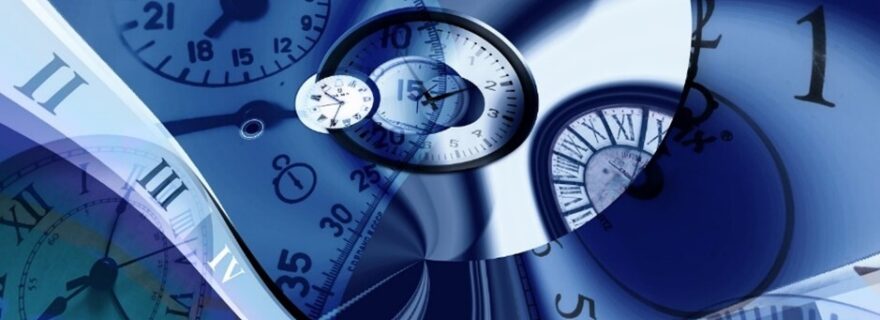Einstein taught us that time is relative, but is our sense of time relative too?
How do we perceive time? What factors influence this process? And is time perception relative? In this article, these questions will be answered with the knowledge humanity has gathered about time perception thus far.
Time perception has been investigated and philosophised about by humans for centuries and is still an extensive field of study in psychology, cognitive linguistics, and neuroscience. Animals including us have evolved and developed the ability to perceive time because it is essential for survival. Nowadays our perception of time still plays an important role in how we perceive reality and the decisions we make based on this reality. Whether you are in front of a red light, waiting at a restaurant or sitting on a plane, time perception influences daily life on a big scale.
Time perception in the body
Humans and many other animals perceive time with a complex system consisting of multiple cooperating brain structures and sensory systems outside of the brain. This combined system processes internal and external stimuli to estimate durations and intervals of time. To keep it simple: Brain structures predominately communicate and process information using the neurotransmitter dopamine, especially when measuring seconds to minutes. The binding targets for dopamine that influence time perception the most are the Dopamine 2 (D2) receptors. For longer durations of time, the brain relies more on episodic memory which is processed by other brain regions with the release of Acetylcholine, another important neurotransmitter. Most animals also have a special brain structure, which is specialized in determining the day-night cycle (circadian rhythm). Aside from the brain structures other non-brain measuring systems like the metabolic rate of an animal influences relative perception of time. Therefore, smaller animals relatively experience time slower than larger animals, which for example gives a fly its huge agility advantage over a dog.
Time illusions
Time perception of animals has evolved to be as accurate as possible, but it is not perfect. Some problems in information processing cause certain mistakes in the estimation of time, which are called temporal illusions. For example: Stimuli for an indication of time enter the brain with different velocities (e.g. auditory information travels slower than visual information), but the brain needs to make one coherent representation of time. Consequently, the brain must wait for the slowest stimulus to enter the brain to shape the representation, resulting in a tenth of a second delay between perceived time and real time. This means that the time we perceive is always slightly in the past, instead of in the present. Another illusion called ‘Vierordt’s law’ states that longer intervals tend to be underestimated whereas shorter intervals tend to be overestimated. And ‘the telescoping effect’ is a phenomenon in which people tend to memorize distant events as happening more recently than they did and memorizing recent events as happening further back in time than they did. The last two phenomena suggests that the brain normalizes perceived time. It is speculated that this occurs to simplify the information at the cost of a little accuracy.
Altered time perception
Although we have a complex time perception system which is capable of remaining constant most of the time, the system is influenced by a lot of factors. For a start, older aged people experience time faster than younger people. This is likely because dopamine levels in the brain decrease over time. Hence the severely impaired time perception of Parkinson’s disease patients which suffer from critically low dopamine concentrations in the brain. Patients with other disorders that are the consequence of distorted dopamine concentrations in the brain like ADHD, autism and schizophrenia can also have an impaired time perception. Furthermore, time perception depends on the level of attention or motivation someone has. When a challenge is too hard or too easy, consequently making you feel either anxious or bored, it results in time going relatively slower than when your skill equals the challenge and you are in a highly concentrated state. The competence to perceive time is also genetic. Functional gene polymorphisms in the ‘COMT’ gene have been identified and linked to an impaired time perception. This gene encodes for the Catechol-O-methyltransferase (COMT) protein, which is an enzyme which degrades dopamine in the brain. The gene polymorphism encodes for a protein which degrades dopamine much faster than the standard protein. Patients who have an impaired time perception are very impulsive and have a high chance to develop substance abuse, indicating a difficulty in daily life functioning.
Manipulating time perception
So, time perception can be altered by many different factors. In fact, some of these factors are even inducible by humans. Different medicinal compounds can be used to manipulate a person’s time perception. D2 antagonists block D2 receptors, consequently diminishing time perception. Stimulants like methamphetamine (crystal meth) result in an overestimation of time and neuroleptics like haloperidol result in an underestimation. In contrast to these perception impairing drugs, perception improving drugs like tolcapone increase time perception. Tolcapone is a COMT enzyme inhibitor and is used to treat patients with the previously named COMT gene polymorphism. Besides chemical substances time perception can also be altered by inducing changes in body temperature. People who are placed in a cold room experience time significantly slower than people who are placed in a hot room. All influencing factors together display that time perception can be altered but also manipulated. In conclusion, time perception is indeed relative. Not only different animal species have different time perception, but time perception between humans is also different. Our time perception system is far from perfect and is prone to many influencing factors that can alter or manipulate our sense of time. Apparently, the famous quote from poet William Carlos Williams could be interpreted more literally than we would initially think (see top of article).



0 Comments